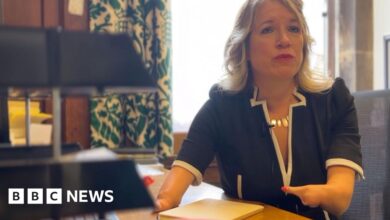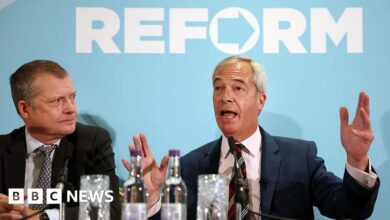Miliband unveils energy plan with new powers over wind farms

The government has unveiled plans to give ministers the final say on approving large onshore wind farms rather than leaving decisions to local councils, where opposition has often been fierce.
The plan is among proposals announced by Energy Secretary Ed Miliband on Friday as part of what the government is calling an “ambitious” action plan for reaching 95% clean energy in the UK by 2030.
Miliband also wants to give powers to the energy regulator to prioritise projects in the queue waiting to link up with the National Grid.
But Conservative Shadow Secretary of State for Energy Security Claire Coutinho said the plans would simply push bills “even higher”.
The government wants to bring large onshore wind projects back into the Nationally Significant Infrastructure Project (NSIP) regime in England – in line with other energy infrastructure.
Labour’s plans would mean the government would have the final say on approving wind farm projects larger than 100MW, rather than councils.
Coutinho said Labour’s “rush” to decarbonise the electricity system by 2030 would push up electricity prices and cause more hardship for people across Britain.
“We need cheap, reliable energy – not even higher bills,” she said.
But Miliband told BBC Breakfast on Friday that the current reliance on gas leaves consumers vulnerable to price changes.
“At the moment we are at the mercy of the rollercoaster of fossil fuel markets – gas prices are subject to the decisions of petrostates and dictators,” he said.
“It is time to have homegrown clean energy that we can control.”
Prior to the election Labour predicted that households would save £300 on their energy bills as a result of its green measures – citing research by independent think tank Ember.
On Friday Miliband reasserted this figure but said it would be “up to £300” – suggesting it could be lower.
Onshore wind is one of the cheapest forms of clean energy. But there has been a 94% decline in projects in England since 2015 when the previous Conservative government tightened planning regulations for wind farms – following pushback from local communities over potential environmental damage.
Subsequently, only a small number of local objections would be enough to effectively block new projects.
Following Labour’s general election victory, planning rules for onshore wind were eased in September 2024. But renewable energy groups said they did not go far enough.
The public will still be consulted on new wind farms, but the secretary of state will be empowered to take any final decision -based on national priorities such as tackling climate change.
Mr Miliband told the BBC’s Today programme on Friday: “There are difficult trade offs here and unless we change the way we do things we are going to be left exposed as a country.
“In the end it will be a national decision.”
The government maintains any project will need to have “direct community benefits” and proposes to establish a recovery fund to invest in nature projects as compensation for any environmental damage.
The 136-page action plan includes other measures to accelerate renewable energy.
Among these are prioritising projects to enable an early connection to the electricity grid, and incentivising private investment.
The government wants to move away from a “first-come first-served” approval process for the grid, and prioritise those likely to be most useful.
There are currently thousands of projects waiting in a queue to be approved to be connected to the UK grid. If all the projects were given the go-ahead, 739GW of energy would be added to the system, 14 times the amount of renewable energy the country currently has.
Labour projects these reforms could attract £40bn a year from mainly private investment in “homegrown clean power projects”.
The industry has been calling for many of these measures for years and broadly welcomed the plans.
Lucy Yu, CEO for think tank Centre for Net Zero, said: “The Clean Power Action Plan shows that the government isn’t afraid to be bold, illustrated by the breadth and nature of proposed changes.”
Yu, who is also a government adviser, warned ministers not to “forget the central role of consumers and communities in the energy transition”.
“The British public’s support will be key, and the government must ensure clean power delivery has their interests at heart.”




